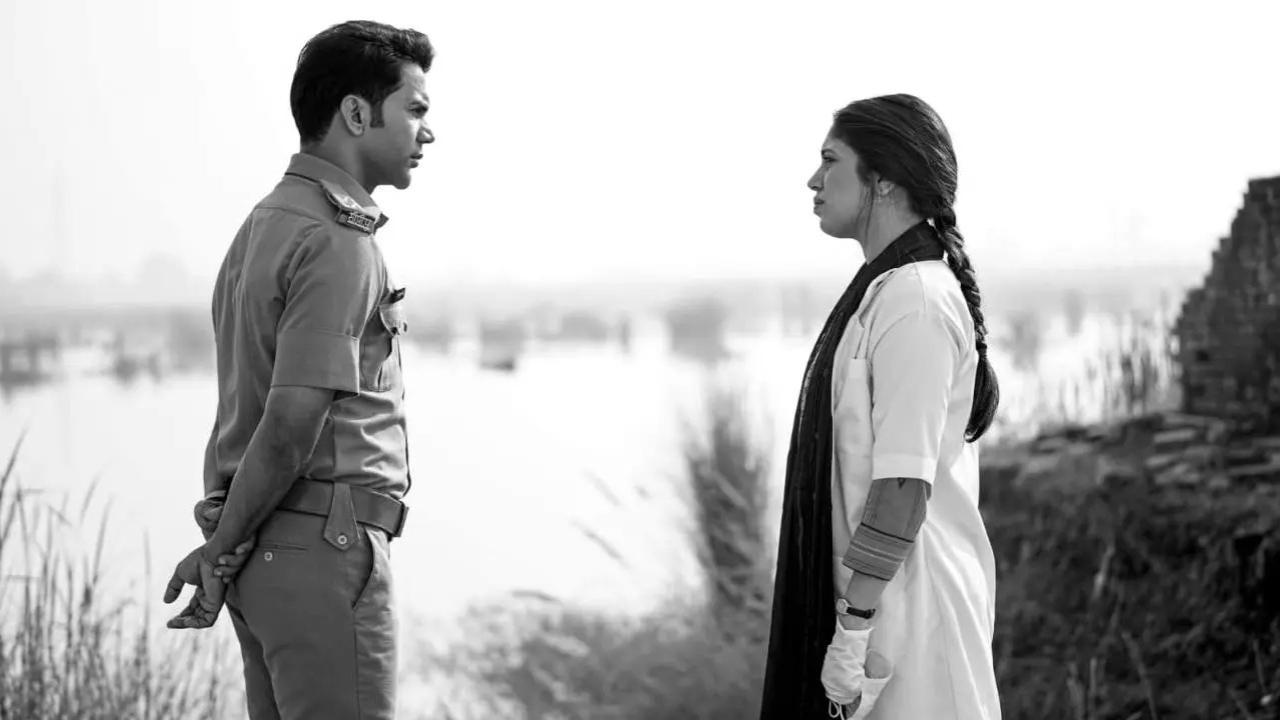Bheed foregrounds instead a series of well-reported events into a singular narrative. Right from the opening sequence of labourers and their families run over by a train — I’m 100 per cent certain you haven’t wiped off your brain that infamous, Aurangabad picture of ‘rotis on the railway track’

Bheed still
Movie: Bheed
Director: Anubhav Sinha
Actors: Rajkummar Rao, Bhumi Pednekar
U/A: Drama
Rating: 3.5/5
ADVERTISEMENT
There was a point when I was in the habit of asking movie professionals, during interviews, to tell us exactly why they make films. “To tell stories,” was the commonest reply.
More so, how did they define a film? Now, this can have multiple answers. Starting with writer Javed Akhtar, who once roughly said “a movie is where there’s a line [before the box-office counter!].”
Which is one way to look at it. But hardly as clear-cut as actor Naseeruddin Shah describing a film to me as simply a story told in images, that adequately reflects its times. Reflecting the times, I guess, being the operative words.
And that’s Bheed for you, right away. It’s about what was collectively the most frightening times we’ve all lived through (and that lakhs couldn’t survive) — the invasion of COVID-19, that earnestly began March, 2020, in India. Which is reflected in this pic, that’s opened in theatres, exactly three years after.
That isn’t to suggest there’s anything particularly unique about Bheed. How can that be? Lockdown is a pandemic film-genre of its own.
Practically everyone with a camera — that’s the whole world, isn’t it — has shot something or the other stored into their Corona Files. God knows, strife produced a lot of public art.
Indeed, the most haunting Indian film I’ve seen on the subject would be Vaikunth (2022) — segment in Amazon Prime Video’s lockdown anthology, Unpaused: Naya Safar (2022) — set in a crematorium, directed-enacted by Nagraj Manjule.
Bheed is written, directed, produced, even presented, by Anubhav Sinha —I suppose the last hyphenate is to ensure nobody else gets into trouble for a dissenting, reasonable, sobering voice that is Sinha’s alone. What sets Bheed apart from other such films is the timing still!
Also Read: Exclusive! Rajkummar Rao: We need a 'Pathaan' but also need a 'Bheed'
It isn’t just viscerally/artistically/emotionally responding to what happened, when Corona came —but insistently reminding its audiences about what exactly did.
Lest, as with everything else, people are gaslit enough into believing not much really did. Sure, everybody’s lost a loved one, at least within two degrees of separation. This is universal/global. The Indian experience of COVID-19, with a bureaucratic decision and its staggering human cost was tragically unique still.
What with the world’s most draconian lockdown, with the shortest heads-up — decreed from an ivory bungalow of Lutyens’ Delhi, without any planning for movement/rehabilitation of “dehadis” (daily-wage) migrants/workers, in big cities, desperate to head to their homes/villages….
We don’t know a global equivalent. Maybe from that distance of decision-making, India does feel like an anonymous crowd. Bheed basically makes people relive those horrors. By which I mean people in my posh multiplex, who didn’t have to hit the street, grazing for food and temporary shelter.
And that’s the reason public memories are deemed short. It depends on which public, and what event. Well, you could also watch Vinod Kapri’s 1232 Kms (on Hotstar+ Disney), where the director, along with an assistant, follows a bunch of migrants, on the road, from Ghaziabad to Saharsa (in Bihar). But that’s a plain documentary.
Bheed foregrounds instead a series of well-reported events into a singular narrative. Right from the opening sequence of labourers and their families run over by a train — I’m 100 per cent certain you haven’t wiped off your brain that infamous, Aurangabad picture of ‘rotis on the railway track’.
Or similar anecdotes of migrants found hiding inside cement-mixer trucks; getting bathed like animals, with sanitisers, through water cannons; getting bashed up by the police…
They’re all here in this Black & White film that is set in one checkpoint, over one dark day, at the border of a state, that’s been sealed, while hundreds/thousands are stranded, waiting for who’ll take the call to finally let them in!
As an audience, you do feel the filmmakers value your concerns as much as your time and attention. You engage with the picture throughout, even with humour and romance, on occasion.
Most of it has to do with the phenomenal actors, playing the main parts to near-perfection: Rajkummar Rao as the conscientious cop, Ashutosh Rana and Aditya Shrivastav as his senior and junior colleagues, Bhumi Pednekar as his girlfriend, Dia Mirza and Pankaj Kapoor for passengers stranded on the street…
I mean, just look at that line-up! Surely, they’ve signed up for this low-budget, middle-brow, “high-content” pic, as it were, for Sinha alone. As a sincere filmmaker with a polemical bent of sorts (since Mulk), Sinha has devised a very direct way of saying it, as he sees it. In a manner that might appear too verbose. But it’s probably essential, when you aren’t preaching to the choir.
He also understands that caste is the key to unlocking India, as it exists — lockdown or not! And that religious hatred is the other virus. You see Bheed expectedly delve into both, making a point about how “justice is delivered by the powerful — if it was delivered by the powerless, it would be a different kind of justice!”
Hence, you find no criticism of the Indian government by name in the film. I’m sure it was there. And that it was expunged by the government’s censors. What’s left is right in front of you — an important record of our times. Through an “empathy generating machine”, which is how film critic Roger Ebert best described a film as.
 Subscribe today by clicking the link and stay updated with the latest news!" Click here!
Subscribe today by clicking the link and stay updated with the latest news!" Click here!







